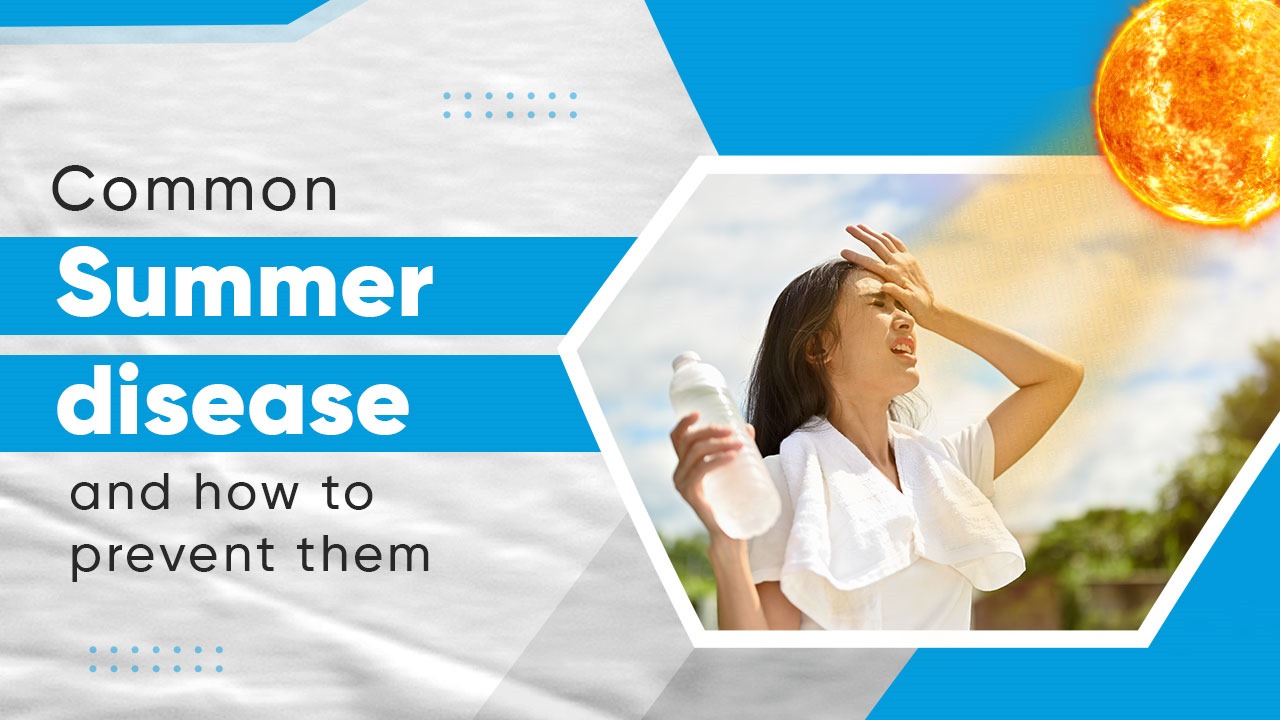As the temperature rises and the sun shines brightly, summer brings not only joyous moments but also health challenges. The combination of intense heat, increased humidity, and outdoor activities creates an environment conducive to various diseases. Understanding these common summer illnesses and taking preventive measures can help you enjoy the season while safeguarding your health.
Here’s a detailed look at some of the most prevalent summer diseases, their symptoms, and effective prevention strategies.
Heat Stroke
Heatstroke is a dangerous condition caused by overheating. It occurs when the body can’t regulate its temperature, leading to symptoms like confusion, a high fever, and rapid breathing. Infants, older adults, and those with chronic illnesses are most at risk. To prevent it, stay hydrated, avoid strenuous activity during peak heat hours, wear loose clothing, and seek air conditioning or shade. If you suspect heatstroke, move the person to a cool area and seek immediate medical attention. Early treatment is crucial to avoid serious complications.
Dehydration
Dehydration strikes when your body loses more fluids than it consumes, often due to summer sweat. The symptoms include thirst and fatigue. Monitor urine color: pale yellow means you’re hydrated, and dark yellow suggests dehydration. Left untreated, it can lead to serious health issues. Drink lots of water to avoid dehydration, especially when participating in outdoor activities, and include fruits and vegetables high in water content.
Food Poisoning
The summer months saw an increase in food poisoning cases because of the warm weather, which speeds up the growth of bacteria in food. Frequent symptoms include fever, diarrhea, vomiting, and stomach pain. Avoid consuming old or badly prepared food, handle and store food properly, and practice excellent hygiene to prevent food poisoning.
Diarrhea
Diarrhea, characterized by frequent loose stools, is a common summer ailment often caused by consuming contaminated food or water. Symptoms like dehydration, abdominal cramps, and bloating can significantly impact your well-being. When traveling or unsure of the quality of the water, consume only purified or boiled water. Additionally, avoid raw or undercooked food, and ensure fruits and vegetables are thoroughly washed before consumption.
Typhoid Fever
Typhoid fever sees a rise in cases during the summer, largely due to poor sanitation and the consumption of contaminated food or water. Typical symptoms of typhoid include high fever, weakness, abdominal pain, headache, and rash. To protect yourself from typhoid, ensure you drink only clean, purified water, consume properly cooked foods, and maintain rigorous personal hygiene practices.
Chikungunya and Dengue Fever
During the summer, the surge in mosquito populations heightens the risk of chikungunya and dengue fever. Both diseases present similar symptoms such as fever, severe joint and muscle pain, headache, nausea, and rash. Preventive measures include eliminating stagnant water where mosquitoes breed, wearing protective clothing, and using effective mosquito repellents.
Heat Rash (Prickly Heat)
Heat rash, also known as prickly heat, is common in hot, humid conditions when sweat ducts become clogged. This results in red bumps, itching, and a prickling sensation on the skin. To avoid heat rash, keep your body cool and dry, choose loose-fitting clothing, and minimize excessive sweating.
Conjunctivitis (Pink Eye)
Summertime brings a higher level of exposure to allergens and irritants, increasing the incidence of conjunctivitis. Symptoms include redness, itching, tearing, and discharge from the eyes. To prevent conjunctivitis, refrain from rubbing your eyes, follow good hygiene practices, and shield your eyes from potential irritants and allergens.
Conclusion
Summertime brings an increased risk of several common diseases, each with its own unique symptoms and preventive measures. By understanding these risks and taking proactive steps such as maintaining good hygiene, protecting against mosquito bites, staying cool, and drinking clean water, you can enjoy a healthier summer. Remember, early detection and timely medical intervention are crucial to managing these summer ailments. Stay informed, stay safe, and make the most of the sunny season.

